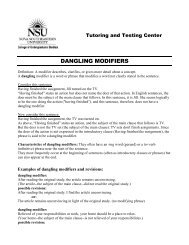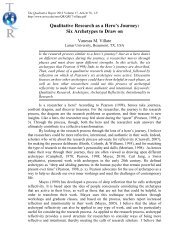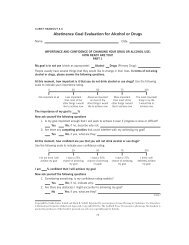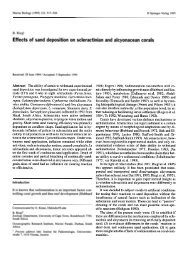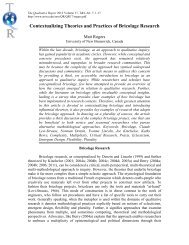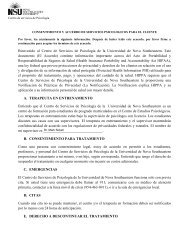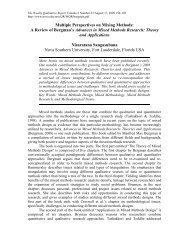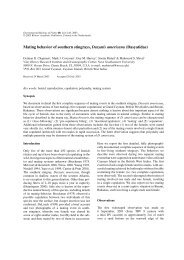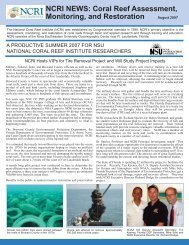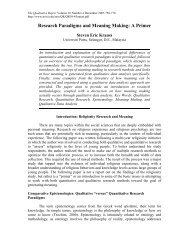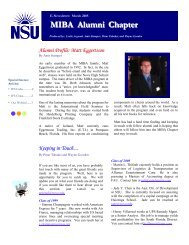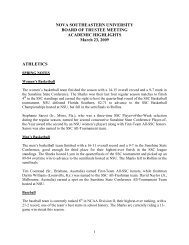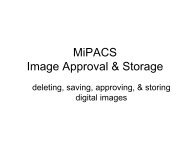Reefs for the Future - Nova Southeastern University
Reefs for the Future - Nova Southeastern University
Reefs for the Future - Nova Southeastern University
Create successful ePaper yourself
Turn your PDF publications into a flip-book with our unique Google optimized e-Paper software.
UNAM. Roberto moved to <strong>the</strong> <strong>University</strong><br />
of Cali<strong>for</strong>nia Santa Barbara,<br />
where he received a Ph.D. in<br />
aquatic and population biology.<br />
After a year as a post-doctoral fellow<br />
at UCSB, Dr. Iglesias-Prieto<br />
moved in 1994 to <strong>the</strong> nor<strong>the</strong>rn<br />
Mexican state of Baja Cali<strong>for</strong>nia to<br />
take a position as a senior scientist<br />
at <strong>the</strong> Center <strong>for</strong> Scientific Research<br />
and Higher Studies of Ensenada.<br />
Since 1996, Roberto has<br />
been a research professor at<br />
UNAM’s laboratory at Puerto<br />
Morelos in <strong>the</strong> Caribbean coast of<br />
<strong>the</strong> Yucatan Peninsula.<br />
Roberto’s main research interest is<br />
<strong>the</strong> photobiology of <strong>the</strong> symbiotic<br />
associations between zooxan<strong>the</strong>llae<br />
and reef-building corals. His work<br />
has been focused on <strong>the</strong> ecological<br />
and evolutionary consequences of<br />
symbiont specificity in corals, <strong>the</strong><br />
effects of <strong>the</strong>rmal and light stress<br />
on <strong>the</strong> organization of <strong>the</strong> photosyn<strong>the</strong>tic<br />
apparatus of symbiotic dinoflagellates,<br />
and <strong>the</strong> role of coral<br />
skeletons as modulators of <strong>the</strong> intracellular<br />
light environment. In addition<br />
to his research interests in<br />
coral reefs, Roberto is currently<br />
serving as <strong>the</strong> head of <strong>the</strong> Scientific<br />
and Technical Advisory Council on<br />
Coral <strong>Reefs</strong> <strong>for</strong> <strong>the</strong> Mexican government.<br />
Bob Cowen,<br />
Rosenstiel School<br />
of Marine &<br />
Atmospheric<br />
Science, USA<br />
Population<br />
Connectivity in<br />
Coral Reef Systems<br />
Tuesday, July 8, 2:00PM<br />
Robert K. Cowen is <strong>the</strong> Robert C.<br />
Maytag Professor of Ichthyology<br />
and Chair of Marine Biology and<br />
Fisheries at <strong>the</strong> <strong>University</strong> of<br />
Miami’s Rosenstiel School of Marine<br />
and Atmospheric Science. He<br />
also holds a joint appointment as<br />
Professor in <strong>the</strong> Department of Biology<br />
at UM. He earned his B.A. at<br />
UCSB, M.S. at <strong>the</strong> Moss Landing<br />
Marine Laboratories and Ph.D. in<br />
biological oceanography at <strong>the</strong><br />
Scripps Institution of Oceanography.<br />
He has authored or co-authored<br />
over 90 publications on<br />
topics ranging from coastal fish<br />
ecology and early life history, to<br />
fishery oceanography, larval transport<br />
and population connectivity.<br />
His research has included both a<br />
field-intensive empirical and biophysical<br />
modeling approach to resolving<br />
<strong>the</strong> mechanisms and <strong>the</strong><br />
population consequences of larval<br />
dispersal. Dr. Cowen is currently<br />
serving on <strong>the</strong> U.S. Ocean Research<br />
and Resource Advisory<br />
Panel (ORRAP), <strong>the</strong> Partnership <strong>for</strong><br />
Interdisciplinary Studies of Coastal<br />
Oceans (PISCO) External Advisory<br />
Committee, NOAA/NSF CAMEO<br />
Steering Committee, JOI Ocean<br />
Observatory Interim Steering Committee,<br />
and as CLIOTOP/GLOBEC<br />
Early Life History Working Group<br />
chair. His o<strong>the</strong>r service activities<br />
have included ICCAT Technical Advisor,<br />
Marine Reserve Consensus<br />
Panel, hosting and participating in<br />
various workshops on <strong>the</strong> topic of<br />
marine population connectivity<br />
and management of Caribbean<br />
coral reefs. Dr. Cowen is also a<br />
member of <strong>the</strong> Connectivity Working<br />
Group of <strong>the</strong> GEF Coral Reef<br />
Targeted Research Program.<br />
11 th International Coral Reef Symposium ■ <strong>Reefs</strong> <strong>for</strong> <strong>the</strong> <strong>Future</strong><br />
Drew Harvell,<br />
Cornell <strong>University</strong>,<br />
USA<br />
Drivers of Coral<br />
Infectious Disease<br />
Wednesday, July 9,<br />
8:30AM<br />
Drew Harvell is a professor of Ecology<br />
and Evolutionary Biology at<br />
Cornell <strong>University</strong>. She is widely<br />
recognized <strong>for</strong> her work on marine<br />
diseases, chairing both <strong>the</strong> World<br />
Bank Targeted Research Program<br />
on Coral Disease and <strong>the</strong> National<br />
Center <strong>for</strong> Ecological Analysis and<br />
Syn<strong>the</strong>sis program on <strong>the</strong> Ecology<br />
of Marine Disease. The current<br />
focus of Dr. Harvell’s laboratory<br />
group is on <strong>the</strong> ecology and evolution<br />
of coral resistance to disease.<br />
A sub<strong>the</strong>me of this work includes<br />
evaluating <strong>the</strong> impacts of a warming<br />
climate on coral reef ecosystems.<br />
Her analyses and papers<br />
have led to <strong>the</strong> now widespread<br />
acceptance that diseases in marine<br />
ecosystems are important, particularly<br />
in <strong>the</strong> very climate-sensitive<br />
coral reef ecosystems. Projects in<br />
her lab involve a variety of approaches,<br />
including field studies,<br />
molecular techniques, chemical<br />
analyses and ma<strong>the</strong>matical modeling.<br />
She has worked <strong>for</strong> many<br />
years on coral reefs in <strong>the</strong> Mexican<br />
Yucatan and Florida Keys and more<br />
recently in <strong>the</strong> Pacific. Her work<br />
has been featured in national and<br />
international media. Dr. Harvell<br />
received her Ph.D. from <strong>the</strong> <strong>University</strong><br />
of Washington in 1985. Following<br />
NATO and NSF<br />
postdoctoral fellowships in 1986,<br />
she joined <strong>the</strong> faculty of Cornell<br />
<strong>University</strong> in 1986. She has been a<br />
sabbatical fellow at National Center<br />
<strong>for</strong> Ecological Analysis and Syn<strong>the</strong>sis<br />
and Vice President of <strong>the</strong> Society<br />
of American Naturalists, is a<br />
senior scientist at The Kohala Center<br />
and serves on <strong>the</strong> editorial<br />
board of Annual Reviews of Ecology,<br />
Evolution and Systematics.<br />
25<br />
Location<br />
In<strong>for</strong>mation<br />
Special<br />
Recognitions<br />
General<br />
In<strong>for</strong>mation<br />
Program Exhibits Oral and Poster<br />
Presentations<br />
Author Index



